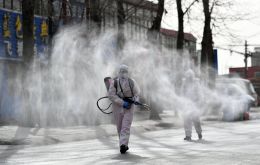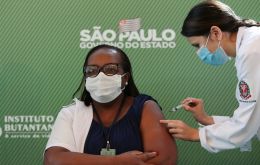MercoPress. South Atlantic News Agency
Health & Science
-
Friday, January 22nd 2021 - 09:34 UTC
Biden signs executive orders increasing production of special syringes and joining the COVAX initiative

United States president Joe Biden spent his first full day in office on Thursday signing a number of executive orders addressing the handling of the coronavirus pandemic, which has affected more people in the United States than anyplace else in the world. The U.S. has 24.6 million of the world’s more than 97 million infections.
-
Friday, January 22nd 2021 - 09:31 UTC
Fitch forecasts Latin American economies will rebound but with downside risks

Fitch Ratings forecasts Latin American economies will rebound this year from the 2020 recession but risks remain in particular because of the evolution of the COVID-19 pandemic.
-
Friday, January 22nd 2021 - 09:30 UTC
WHO chief thanks Biden and Fauci for keeping the US a member of the organization

At the meeting of the 148th session of the Executive Board of the World Health Organization (WHO) on Thursday, WHO Director-General Dr Tedros welcomed the pledge that the United States will remain a member of WHO.
-
Friday, January 22nd 2021 - 09:30 UTC
Covid-19: Peruvians doctors on hunger strike to protest government non action

A group of Peruvian doctors launched a hunger strike this week to protest the government’s lack of preparation for a second wave of COVID-19 cases.
-
Friday, January 22nd 2021 - 09:29 UTC
Biden pledges to vaccinate 100 million Americans in the next 100 days

Total deaths from the coronavirus pandemic in the United States “will likely top 500,000 next month,” President Joe Biden warned on Thursday, as he explained his government's plan to curb the toll the disease has been taking on Americans.
-
Friday, January 22nd 2021 - 09:08 UTC
Brazilian meatpacker announces China has lifted bans on two processing plants

Brazilian meatpacker JBS SA announced that China has lifted bans on two meat plants imposed in 2020 over coronavirus concerns.
-
Friday, January 22nd 2021 - 08:32 UTC
Brazil keeps Selic rate at 2%, but uncertainty about economic growth remains

The Brazil Central bank rate setting committee, Copom, unanimously decided on Wednesday to maintain the Selic rate at 2.00% for the fourth time running, but anticipating that inflation expectations for the next two years have risen and uncertainty surrounds the Brazilian economy in the short term.
-
Thursday, January 21st 2021 - 00:48 UTC
Lufthansa to fly nontop to Falklands carrying German scientists

German carrier Lufthansa Wednesday issued a press release confirming plans are underway for a nonstop charter flight between Hamburg and Mount Pleasant in the Falkland Islands for scientific purposes. The airline highlighted the trip will be one of its longest nonstop stretches ever.
-
Tuesday, January 19th 2021 - 09:25 UTC
Independent panel blasts WHO and China on their tepid response to the initial Covid-19 outbreak

An independent panel said on Monday that Chinese officials could have applied public health measures more forcefully in January to curb the initial COVID-19 outbreak, and criticized the World Health Organization (WHO) for not declaring an international emergency until Jan. 30.
-
Tuesday, January 19th 2021 - 09:16 UTC
Brazil launches vaccination campaign, but many supply problems persist

Brazil launched on Monday the national inoculation program with China's Sinovac Biotech vaccine, but so far it includes five of the country's 26 states. After weeks of setbacks, many Brazilians cheered the first wave of inoculations, from bustling clinics in Sao Paulo to a spectacular shot planned at the foot of the Christ Redeemer statue overlooking Rio de Janeiro.